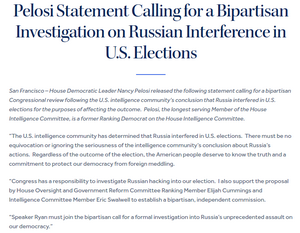The Russia connectionAgents of deceit: Russian disinformation institutions and actors
There is a burgeoning Western literature on Russian policy and practice in disinformation, but very little of it has detailed and reliable material about the government agencies and affiliated actors that promote it. A new, detailed report investigates the institutions and actors involved in Russian disinformation.

Congress anticipates Russian interference in U.S. 2020 elections // Source: commons.wikimedia.org
A new report from the Center for Research and Evidence on Security Threats (CREST) by Cerwyn Moore, one of four reports on Russia and disinformation, focuses on the institutions and actors involved in Russian disinformation. CREST notes that the new report should be read in conjunction with the CREST Report on Disinformation and Maskirovka, and the two other reports in the series, which examine case studies on disinformation.
This report outlines the contemporary context in which disinformation occurs, as conceived and practiced by actors in the Russian Federation.
The aim of this report is to investigate in more depth Russia institutions and actors that contribute in various ways in the promotion of Russian disinformation. It considers, among other things, the following themes:
· Governmental and affiliated institutions involved in disinformation activities.
· The role of state and non-state/sub-state actors and networks in disinformation.
· To what extent disinformation can be traced to specific actors or agents of influence.
There is a burgeoning Western literature on Russian policy and practice in disinformation, but very little of it has detailed and reliable material about the government agencies and affiliated actors that promote it. Many studies refer broadly to “the Kremlin” or the “power agencies” as the principal actors in this field, but a wider array of actors and agents can be identified as being involved.
At the softer end of the power spectrum, agents of traditional diplomacy and cultural diplomacy, the Russian Orthodox Church, representatives of higher educational institutions, youth movements and intergovernmental foundations are active in the dissemination of Russian “strategic narratives” and creating what Russian officials refer to as a “humanitarian product for export.”
In terms of disinformation as a set of tools to promote political influence and entrench Russian power, the field is similarly wide, with political/social activists, covert intelligence networks, the traditional media (print/visual/digital) and trolls, bots and purveyors of ‘fake news’ contributing to it.
The new report draws on extensive scrutiny of open-source material, including from Russian-language primary sources, particularly on the relevant government agencies, as well as Western academic research and policy-related documents prepared by experts in the field.
This report is part of a series on disinformation to come out of CREST’s Actors and Narratives program. The other three reports in the Russia and Disinformation series: The Case of the Caucasus, The Case of Ukraine, and Maskirovka.
— Read more in Russia and Disinformation: Institutions and Actors (Full Report) (Crest, 2019)
